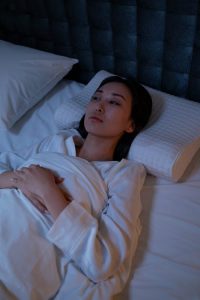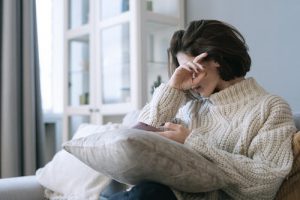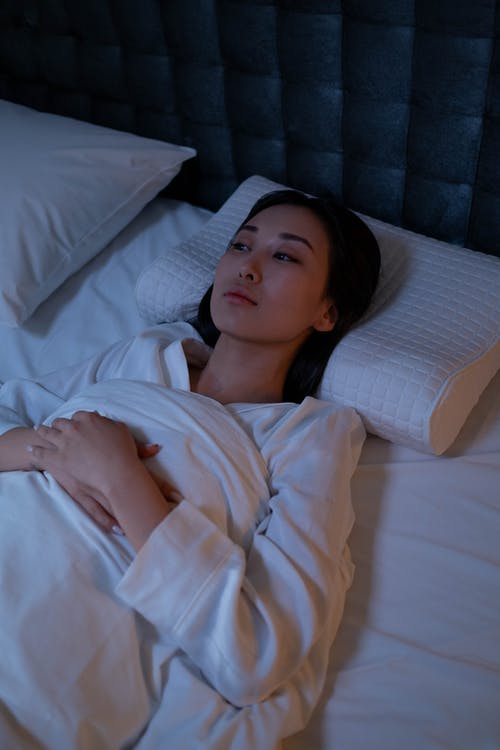Sleep Disturbance has been called one of the most common side effects of the coronavirus. According to statistics, many people who have had COVID-19 experience it.
Table of Contents
COVID Dreams and Hallucinations
French scientists published an article describing the long-term consequences of the postponed COVID-19.
In the patients they observed, on average 110 days after discharge, the most frequent persistent symptoms were fatigue (55%), memory loss (34%), decreased concentration (28%), and sleep disturbance (30.8%).
The quality of life was severely affected for many, and some of those who had recovered could not even return to their work duties due to cognitive problems and weakness.
USA experts believe that such complications can persist up to two years after the infection.

What sleep disturbance is for COVID-infected people during illness and after recovery?
When the nervous system is damaged by a virus, patients may complain of insomnia, which manifests itself:
- Trouble falling asleep (obsessive type);
- Night or early awakenings, after which a person cannot fall asleep again, no matter how hard he tries (depressive type).
- In some of those who have recovered from COVID-19, after recovery, insomnia goes away without any treatment, in others it persists for months.
Many patients also complain of the appearance of nightmares and other acutely experienced, emotionally colored, memorable dreams – instead of rest, sleep turns into a nightly “watching thrillers.
Why do people see nightmares after COVID?
Why does insomnia appear with coronavirus? The mechanism of sleep disorders in patients with COVID is not yet fully understood.
Doctors believe that insomnia with COVID is associated with both the direct action of the virus on the affected nerve cells, and with other manifestations of the disease – high temperature, lack of oxygen, heart rhythm disturbances.
And also – with a stressful situation in which a person gets sick with a dangerous, incomprehensible, unpredictable and therefore even more “terrible” disease.
Vivid dreams after Covid?
Unusual vivid dreams are a frequent companion of COVID-19. Nightmares with coronavirus are not always nightmares in the usual sense of the word.
For example, a dream can become an endless, difficult journey in an unsuccessful search for a way out, a solution to a problem.
No less acutely ill people experience dreams in which everything is safe, reliable, calm, safe, protected.
For example, a person may dream that the epidemic is over – by itself or with the help of some miracle medicine.
That he and his loved ones are completely healthy. That his business was not closed, and the world returned to its former life – without masks and any restrictions.
It is not surprising that in the morning, leaving this ideal world and returning to a disturbing reality, he feels lonely, disappointed, unhappy.
Together with a lack of sleep, such dreams not only cause a person physical and mental suffering, but also complicate the course of the disease, reducing the effectiveness of treatment and increasing the risk of serious complications.

Why are insomnia and Sleep Disturbance dangerous in coronavirus?
Adequate healthy sleep is a prerequisite for the successful fight against any infectious disease. During sleep, our body rests and “replenishes weapons” to fight bacteria and viruses.
If a person falls asleep on time and sleeps for 7-8 hours at night, his immune system has time to recover.
With COVID, this is especially important: in order to recognize the virus, and, even more so, to defeat it, the immune system must be strong and work like a clock.
The consequence of insufficient and poor-quality sleep is not only a sharp weakening of the immune system, but also an increase in blood pressure, heart rhythm disturbances, oxygen starvation of the heart muscle and brain, an increase in the amount of sugar in the blood, depressive disorders and a number of other disorders.
Against this background, the viral load is tolerated much worse, the disease is more severe, the risk of complications is higher, including heart attacks, strokes, neuropathies.
Prolonged insomnia, exhausting nightmares and other emotionally colored, memorable dreams lead to disturbances from the side of the central nervous system – a person becomes absent-minded, his memory deteriorates, the tolerance of mental stress, the ability to think logically, and creativity decreases.
How do people who initially suffer from sleep apnea tolerate COVID?
In view of the above, in people who slept little and / or poorly before the disease, the disease should be more severe – and this is true.
In obstructive sleep apnea syndrome (OSAS), sleep disorders of a different origin, insomnia, the structure of sleep is disturbed.
This leads to the fact that the immune system cannot fully recover at night.
Weakened immunity, faced with an “unfamiliar enemy” and forced to work in extreme conditions, often does not cope with the tasks assigned to it.
As a result, the disease can develop in two ways:
- Immunity actually does not work, and therefore the virus practically does not encounter obstacles in its path and occupies everything in a row – lungs, heart and blood vessels, nerves, muscles, joints, endocrine glands.
After a few weeks, the patient develops various complications – thrombosis (and associated heart attacks, strokes), alopecia (hair loss), exacerbation of chronic connective tissue diseases (arthritis, arthrosis, vertebral hernias), depression, neuropathy, psychosis, etc. - Immunity “turns on” too late and begins to work in an emergency mode, as a result of which a huge amount of special substances – cytokines – are formed in the sick person’s body. Normally, these substances should appear at the initial stage of the disease, in small quantities and destroy the “diseased” cells.

With an extensive viral lesion, an excess of cytokines and insufficient control by the immune system, massive death of cells of various organs, including vital ones, occurs.
As a result of such a massive attack, a very serious condition, known as a “cytokine storm”, develops very quickly.
And doctors have to fight not only and not so much with the coronavirus itself and its action, but with the destructive consequences of the immune response.
With all the possibilities of modern medicine, the prognosis for patients with COVID-19 with a cytokine storm is unfavorable – in 70% of cases, the disease ends in death.
Thus, in the context of the coronavirus pandemic, the issue of the proper quality of night sleep becomes, in the literal sense of the word, vital.
Especially for elderly people with diabetes, overweight, cardiovascular diseases.
